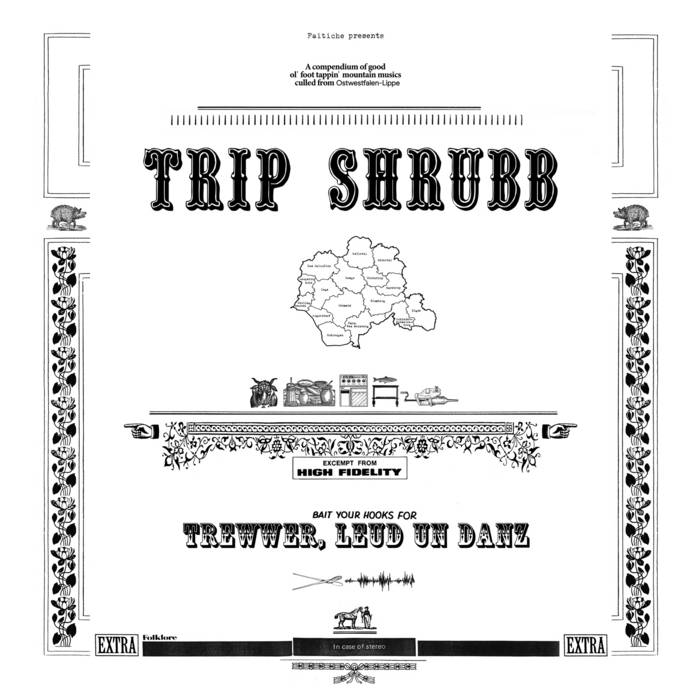 Under a name (Trip Shrubb) taken from a gravestone in Northamptonshire, Michael Beckett presents a cool subterranean selection from his own 84-track transformation of one of the best records ever released: the Anthology of American Folk Music originally compiled by Harry Smith in 1952. Smith, a painter, filmmaker, and obsessive collector of everything from paper airplanes and string figures, to quilts and Ukrainian Easter eggs, curated the Anthology from thousands of 78 RPM records. Trewwer, Leud un Danz is an appropriate companion piece, which matches the obsessive nature of Smith’s vision, serves as a bizarre reminder that a lot of "old, weird, America" comes from older, weirder, Europe, and could also pass for a great soundtrack to Harry Smith’s simply wild experimental films such as Heaven and Earth Magic.
Under a name (Trip Shrubb) taken from a gravestone in Northamptonshire, Michael Beckett presents a cool subterranean selection from his own 84-track transformation of one of the best records ever released: the Anthology of American Folk Music originally compiled by Harry Smith in 1952. Smith, a painter, filmmaker, and obsessive collector of everything from paper airplanes and string figures, to quilts and Ukrainian Easter eggs, curated the Anthology from thousands of 78 RPM records. Trewwer, Leud un Danz is an appropriate companion piece, which matches the obsessive nature of Smith’s vision, serves as a bizarre reminder that a lot of "old, weird, America" comes from older, weirder, Europe, and could also pass for a great soundtrack to Harry Smith’s simply wild experimental films such as Heaven and Earth Magic.
I am reminded of Eric Cantona, the footballer who faced criminal charges and widespread moral outrage for leaping into a hostile crowd and kung-fu kicking then thumping a particularly obnoxious fan. Asked if he wished to express regret, Cantona replied "I have one regret, I would have loved to have kicked him even harder."  Well, no one is going to accuse Beckett of half-measures. In fact, I suggest that the reason he has sampled and "effected" the living blood, skin, and bone (plus marrow) daylights out of the original source material is because he loves it so much. Either way, he has given it an absolute shellacking. This is no pale representation of the real thing. Nor is it a smug authentication by an earnest arty type in exchange for them basking in reflected glory. The icing on this sauerkraut is that Beckett has even further disguised the material by translating song titles into the "Low German" dialect. Harry Smith himself would not recognize them in a blind hearing. I gave up trying to work out track titles after, possibly, cracking a couple. The psycho jet-lagged juju-dub rendition of "Wake up, Jacob" (originally by Prince Albert Hunt’s Texas Ramblers) lurches and swings so strangely that it could get away with being retitled "Jackie Mittoo’s Shoes In a Tumble Dryer (dub)".
"Pülper" could be taken from Sister Mary Nelson’s "Judgement" but if so the impossible has occurred and her gritty voice has acted as a lathe and smoothed the recorded sound of her gritty voice into a completely unexpected ambient drone. These examples, if correct, show Becket embracing the Cajun dance and the Gospel aspects of the Anthology which were mostly ignored by 1950s and 1960s folk revivalists and country blues enthusiasts. What he has also done is to strip away what Robert Cantwell identified as the aesthetic, anthropological, curatorial, and political aspects which have become attached to the Anthology, while thankfully leaving intact the weird and whimsical spirit of the music.
Beckett muffles and strips these tunes down to such an embryonic state he could almost be soundtracking ultrasound images. He stretches, reshapes, muffles and mauls them into a primitive throbbing techno-gumbo beyond all recognition. It is hard to describe music which resists concrete analysis. While it never completely resembles either extreme, much of the album hits a fluctuating sweet spot between romantic Ray Noble-derived amnesia ballroom noir and the kind of can't-look-away shovel-scraping nocturnal terror of the Twin Peaks:The Return episode Got a Light? Beckett clearly has an idiosyncratic wit of which Harry Smith may well have approved. After all, a glance at Smith’s own accompanying descriptions to each original track reveals the opposite of a dry encyclopedic style: Misanthropic Drunk Finally Kicks The Bucket; Town Rejoices. Guthrie Tune Objects To Sanctimonious Berlin Anthem; Reappropriated As Emblem Of Patriotism, American Landscape. Man Encounters Ex-Lover ReEmerged As Apparition; Ghost Asks How He Likes His New Fling. Anyone who considers the Anthology to be a sacred untouchable document may wish to know, or remember (as Katherine Skinner has noted) that there was little critical hoopla or sales to greet the 1952 release. It was not mentioned in the popular press until 1958 (in the folk music magazine Sing Out!, which did not even review the full collection until 1969). And, as Skinner adds, in the first year the Folkways label only sold fifty albums, and forty-seven of those were to colleges and libraries. I reckon Trewwer, Leud un Danz can beat that.
I would pay good money to be able to hear Harry Smith's response to this record, almost as much as I would shell out on ringside seats for Nina Simone's reaction to the recent project involving a piece of her discarded gum. Meanwhile, perhaps Trip Shrubb can next take a crack at the 2020 Dust-to-Digital label release of the Anthology b-sides, or at least give those pieces which were omitted for racist or otherwise offensive lyrics the sound thrashing they may deserve.
Read More

